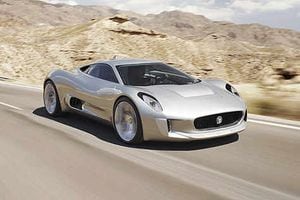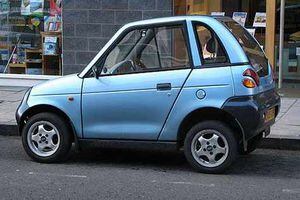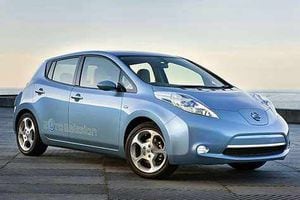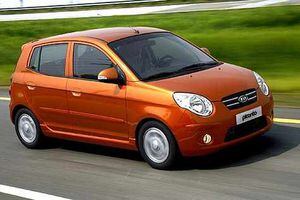Electric cars: the future, or a flop?
Electric cars will start appearing on our roads in bigger numbers during 2011 - but are they as environmentally friendly as manufacturers would have us believe? We examine both sides of the debate.





Electric cars will start appearing on our roads in bigger numbers during 2011 - but are they as environmentally friendly as manufacturers would have us believe? We examine both sides of the debate.
"They are coming, whether we like it or not," says motoring editor Peter Carroll
Of all the cars unveiled at this year's Paris Motor Show, perhaps none was as stunning as Jaguar's C-X75.
This concept supercar boasts sensational looks with a futuristic interior and performance to match: it rockets to 60mph in just over three seconds and has a top speed of 205mph.
Yet unlike other supercars, it's no gas guzzler.
That's because it's electric-powered, with emissions that are a fraction of those produced by even the cleanest city cars of today.
Jaguar bosses are mulling over whether or not to build it - but even if they decide against it, the C-X75 shows how far electric vehicle technology has come.
Granted, there are few fully electric cars on our roads today, but that will change.
Most major manufacturers plan to launch an electric vehicle in the coming years.
There are undeniably 'issues' with these pioneering electric vehicles (or EVs, as they are known).
Their range is limited, battery packs are cumbersome and difficult to dispose of, and the cars are hugely more expensive than their petrol or diesel equivalents.
But criticising them is going to get you as far as the the vinyl-loving music fans who opposed the introduction of CDs in the 1980s.
(The music industry quickly realised it could charge more for the new format - and once record companies started adding bonus tracks to CDs that you couldn't get on 12-inch albums, the game was up for vinyl.)
So it is with electric cars. We are in the middle of an automotive format war and the car industry wants us to drive electric vehicles: so we'd better get used to it.
They already make a lot of sense for council fleets, large corporations and public transport. And in time, EVs should develop more appeal for individual users.
Battery packs will become smaller and more efficient. Prices will come down and more of us will be able to take advantage of the phenomenally low running costs that they promise - at least until the government starts taxing them.
They're decent to drive too and far from the dawdling milkfloat that you might expect.
Acceleration from a standing start is surprisingly rapid.
And because they're so quiet, people living alongside busy highways may find rush hour becomes more bearable in the future.
Opponents are right when they that electric cars rely on 'dirty' power stations for their electricity.
But surely it will be easier to target the emissions of a few power stations rather than the exhausts of millions of cars?
In any case, if EVs end up reducing our dependence on oil - and the countries that produce the stuff - then that's probably no bad thing.
However, the biggest hurdle that electric cars must overcome is drivers' fear of conking out miles from home.
This so-called 'range anxiety' will become less of a problem once a national network of charging points has been built - and these cost a fraction of the price of a petrol station.
Besides, the concept supercar on show at Paris may have solved this issue anyway - which is ultimately what makes it so exciting.
The Jag's novel power system features an electric motor at each wheel, using electricity generated by two aircraft-style micro gas turbines. These extend the car's range to a far more satisfactory 560 miles.
So that's 0-60 in three seconds and no more range anxiety. . . If the X-75C is the future, then count me in.
"Electric cars are over-hyped, over-priced and over-rated," says Mark Andrews
It's a tough call, isn't it? You can spend less than six grand on the Kia Picanto, a cheap, conventional small car which seats four in reasonable comfort.
Or pay nearly twice as much on the painfully cramped G-Wiz, which has the driver appeal of a milk float, and the dignity of a spacehopper.
The G-Wiz, which costs nearly £10,000, is the world's best-selling electric vehicle, with the likes of Jonathan Ross among its famous owners.
It's not hard to see why celebrities love the G-Wiz. By their very nature,showbiz personalities love being the centre of attention, and there is no doubt the sight of Jonathan Ross driving a tiny electric car through the centre of London will turn a few heads.
But that doesn't alter the fact for everyday transport it is close to useless. Aside from the lack of space, the G-Wiz has a maximum speed of 50mph, and can travel for just 49 miles before needing eight hours on the charger.
Yes, the running costs are miniscule. The manufacturer says the G-Wiz can be run for just 1p a mile, compared to 15p a mile for a petrol car.
So if you can bear the indignity and discomfort of driving a G-Wiz for 4,000 miles, you will save the princely sum of £600. Well worth shelling out an extra four grand, then.
Of course, the G-Wiz is only intended for urban commuting. If you want to travel longer distances, you will either have to buy an ordinary car as well, which means yet more expense, or try something like the Nissan Leaf.
The Leaf represents the cutting edge of electric-car technology. It looks like a normal car and drives like a normal car, more than capable of holding its own on the motorway.
Perfect for a family holiday? Well maybe. Providing you only ever want to spend your holidays in New Brighton.
Because if you live in the West Midlands, the Merseyside riviera is the only bit of coast Nissan Leaf owners will ever see, without stopping for a recharge.
Even that is cutting it fine. The Leaf is said to have a range of 100 miles, and it is 99 miles from Wolverhampton to New Brighton.
Would you chance it? I wouldn't.
And if you fancy going to Blackpool (115 miles), or Weston-super-Mare (110 miles), forget it.
Yes, it's exempt from the London congestion charge. But the bad news is it won't get there without a recharge.
And the price? Even after the £5,000 government grant, which we're all paying for, it still manages to cost £8,000 more than the Ford Focus, which can make it to the coast without a recharge.
And when the subsidies run out? Expect to shell out £28,000. A Vauxhall Astra rival for the price of a big Merc.
As for zero emissions, it is poppycock.
Where do these environmentalists think electricity comes from?
Seven per cent of Britain's electricity comes from the Drax power station in Yorkshire, which churns out more than 20 million tons of CO2 every year, making it the largest single source of CO2 in the UK. Just 1.8 per cent of the UK's energy supplies come from renewable sources.
And what happens 10 years on, when the scrapyards are crammed full with worn-out electric cars, complete with their giant lead-based batteries? Disposing of them could prove an environmental nightmare.
The reality is, there is nothing new about electric cars. The first electric car was built by Scot Robert Anderson in the 1830s.
It was supplanted by the internal combustion engine because petrol power has proved better in almost every way. Battery-powered cars are not the future, but the dim and distant past.
Impractical, expensive, slow, and not particularly environmentally friendly, electric cars are great as status symbols for the stars. But they're definitely not for me or you.
See our gallery for more pictures of electric cars





